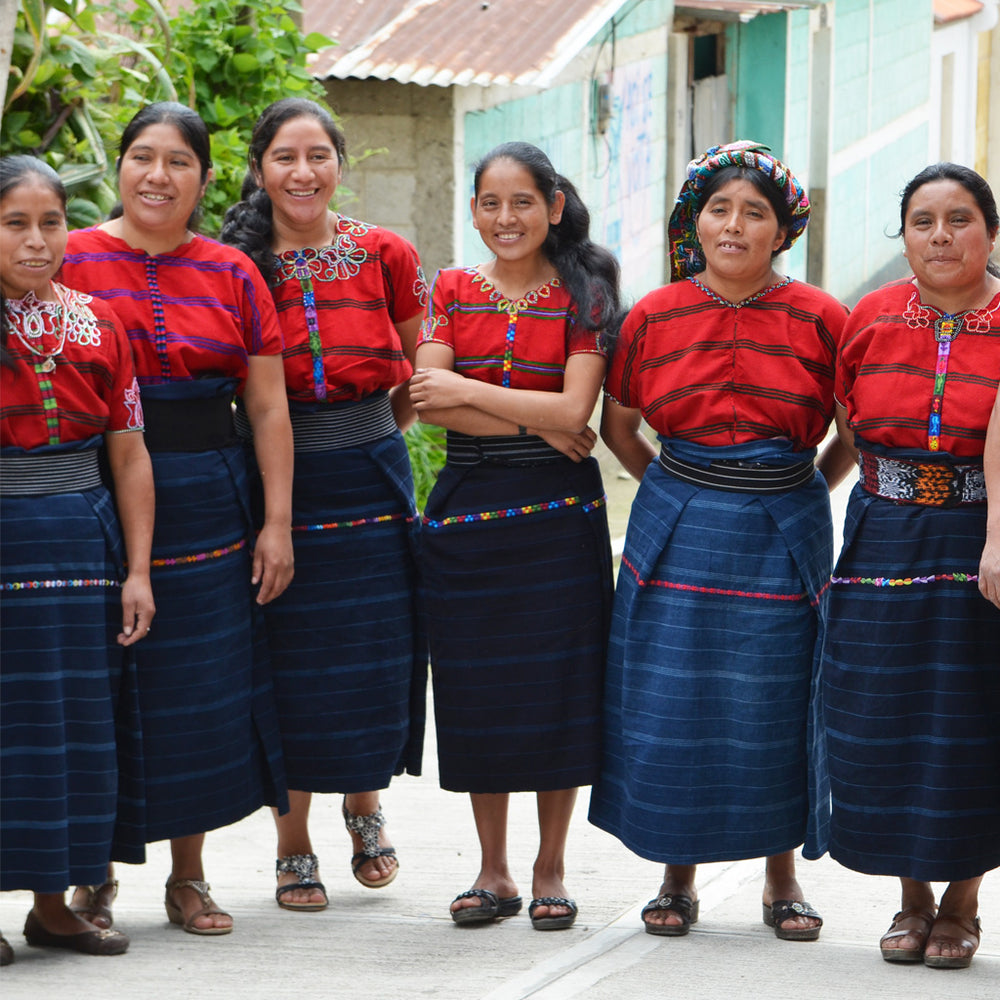October is Fair Trade Month

October is Fair Trade Month, a time to raise awareness about the importance of fair trade to the global economy and to promote purchasing from businesses that are committed to fair trade. It’s about knowing who you are purchasing products from every day. Asking questions. Who grew your coffee beans? Who sewed your clothes? Were those farmers or seamstresses paid a fair wage?
So why did Mayamam Weavers decide to join the Fair Trade movement? Actually, our story mimics the history of the fair trade movement -- wanting to help a community combat poverty through employment. In this case, employment using traditional skills (weaving), but directed towards a market that could pay living wages (USA). In Mayamam Weavers’ home community of Cajolá, Guatemala, there is a grim reality. Ninety-three percent of the population lives in poverty and over 66% of the children are malnourished. Men and women are forced to leave their families and migrate to the US out of desperation, out of a need to earn money and to feed their families. By helping people develop their skills to make and market products in their home communities, families can stay together, can afford to feed their children and educate them.
With all the businesses out there trying to appeal to our conscience, it can be difficult to figure out who is really doing the right thing. Mayamam Weavers is a proud member of the Fair Trade Federation; but what does this mean? The Fair Trade Federation is not a certification but an organization that offers memberships to businesses that exceed the expectations of fair trade and are required to follow the 9 principles of fair trade. All members of the Fair Trade Federation are committed to the practice that every business decision is made with the well-being of the artisans in mind.

The 9 Principles of Fair Trade are:
Create Opportunities
Poverty can be alleviated when long term trading partnerships are developed. In our case, Mayamam Weavers was created to provide jobs within the community to women to sell their hand woven products to the U.S. market.
Develop Transparent and Accountable Relationships
Open and fair relationships have formed over the years. As more women participated in the cooperative that had gone to secondary school (more than half of the women had never been to school) they were able to learn business skills and understand better the relationships they had with Mayamam Weavers in the U.S.
Build Capacity
New opportunities are developed through workshops and trainings – we’re excited that the women are learning to weave jaspe, also known as ikat. They have learned to weave complex designs on the foot looms, and they learned how to start and operate a personal savings circle.

Promote Fair Trade
Fair Trade is explained and promoted through social media and blog posts (like this!) to customers and followers. Information is shared like why you shouldn't be able to purchase a huipil for very little money.
Pay Promptly and Fairly
The members of the cooperative are paid once a month for the work that they have completed. They are paid a fair wage that is directly deposited into a bank account. (They had to open bank accounts! a new experience that took some getting used to.)
Support Safe and Empowering Working Conditions
We continue to look for ways to improve working conditions. The first challenge is teaching the women that they should not accept pain as a part of work. The  backstrap weavers use adjustable, ergonomic benches to keep their bodies in a comfortable position for long periods of time. After the seamstresses complained of pain they received ergonomic chairs as well. The members of the cooperative are offered the opportunity to join a weekly exercise class.
backstrap weavers use adjustable, ergonomic benches to keep their bodies in a comfortable position for long periods of time. After the seamstresses complained of pain they received ergonomic chairs as well. The members of the cooperative are offered the opportunity to join a weekly exercise class.
Cultivate Environmental Stewardship
The cooperative looks for new ways to repurpose scraps. They currently work with non-toxic dyes and are exploring using organic cotton. In September, the members of the cooperative joined the community in planting 1200 saplings!
Ensure the Rights of Children
Mayamam Weavers never exploits child labor. The children of the weavers and seamstresses are invited to attend the nearby preschool at no cost and they are eligible for educational scholarships.
Respect the Cultural Identity
The traditions of the local community are respected. The women have flexible work hours in order to attend social obligations, take care of sick relatives, attend funerals, etc. The cooperative makes decisions as a consensus. The cooperative is organized under coordinators instead of supervisors, a collective approach rather than hierarchical.
 The Fair Trade Federation offers membership to stores, cafes and businesses from the United States and Canada. The producers though, currently have to be from the “Global South” as the Federation is attempting to stop poverty for overseas producers shipping goods to the North. The focused range of the US and Canada allows the federation to have a reliable grasp on the practices of the businesses they endorse. They work with business owners and artisans to make sure nothing falls through the cracks and fair treatment, pay and practices are the top priority for all. The Fair Trade Federation has a directory of members on their website as well as a directory of stores and cafés.
The Fair Trade Federation offers membership to stores, cafes and businesses from the United States and Canada. The producers though, currently have to be from the “Global South” as the Federation is attempting to stop poverty for overseas producers shipping goods to the North. The focused range of the US and Canada allows the federation to have a reliable grasp on the practices of the businesses they endorse. They work with business owners and artisans to make sure nothing falls through the cracks and fair treatment, pay and practices are the top priority for all. The Fair Trade Federation has a directory of members on their website as well as a directory of stores and cafés.
So even as October ends, continue to ask questions of the companies you choose to purchase from. If you find a bargain – and you pay $4 for a t-shirt in a store, what do you think the person who made that shirt is getting paid for it (after shipping, retail mark up, etc)? Use your purchases to cast a vote – a vote for Fair Trade practices!


Leave a comment